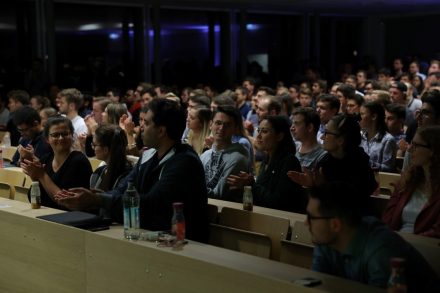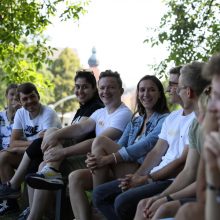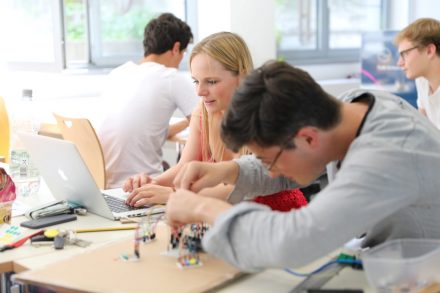The CDTM is one of Munich’s most successful startup hotbeds — numerous promising young companies have already been launched from here! A total of 160 newly founded companies have emerged from the ‘Center for Digital Technology and Management,’ including many extremely successful startups. For example, the founders of eGym, Konux, Navvis and Freeletics all met at the startup hotbed — and that’s just a small excerpt from the impressive list of CDTM alumni. Moreover, many of its alumni have become serial entrepreneurs, such as Konstantin Mehl. Our questions were answered by Michael Chromik, who is responsible for strategic partnerships in the current CDTM management team.
Please introduce yourself!
The Center for Digital Technology and Management (CDTM) is a joint institution of the two Munich universities Ludwig Maximilian University (LMU) and the Technical University of Munich (TUM). The center offers talented students from all disciplines the add-on study program “Technology Management.” That’s why we primarily view ourselves as an educational establishment with a focus on innovation in the digital age. Our course format cultivates entrepreneurial thinking in our students and promotes collaboration in interdisciplinary teams. That inspires and motivates our graduates to found companies and gives them outstanding prospects of success.
Our “center” is managed by ten PhD students. As you might imagine, those few people can’t handle everything mentioned above on their own. That’s why the CDTM is set up as a student-driven organization. All of its active students are involved in the business operations of the program. As a result, we are constantly changing and always able to stay up-to-date on current developments.

Our different formats offer the Munich startup scene a platform for making contacts, such as Inspire&Dine. Three times each semester, the event attracts approximately 300 guests with interesting presentations and networking opportunities over a beer or two.
“Willing to take unusual paths”
The CDTM is considered a startup hotbed for founders. What makes your students special?
Our students come from different disciplines and countries and are very highly motivated. In addition to their subject-based expertise, they’re also able to work together with other disciplines. That’s demonstrated by their team spirit and willingness to take responsibility for one another and to also make a contribution. With that combination of skills, it is easy for them to challenge the status quo and to find creative solutions for projects in the daily life of an entrepreneur.
The community is part of the CDTM’s success

What makes the CDTM’s success special?
The special kind of solidarity among the current students and our alumni’s strong loyalty to the CDTM — in other words, the community. That also includes the practiced interdisciplinary approach, diversity and hands-on mentality of the students, PhD students, alumni and participating professors. Everyone here would like to shape and develop the CDTM, and they are always willing to take unusual paths if needed. The special trust from our partners in business and public institutions is also is also an extremely important factor of our success. Even after twenty years, that exceptional spirit keeps the CDTM and the idea behind from ever looking old.
To be successful, a startup needs to…
… continuously challenge itself!
What’s the biggest mistake a founder can make?
Here’s a small selection from our experience:
- First off, founders often only rely on their own skills. However, a successful startup always needs a team with members that ideally complement one another.
- Secondly, startups often fail because the individual members of the founding team didn’t communicate their expectations.
- Thirdly, founders shouldn’t just keep their ideas to themselves and work on them alone behind closed doors. On the contrary, you should have your idea validated as early on as possible by relevant experts.
How projects become startups
You also work with many companies — startups and corporations — as partners. How does that collaboration work?

We basically work within the framework of course collaborations in the subject areas of trend analysis, prototype development and business strategy. Companies — from startups to global concerns — take on the role of project partner to work hands-on with CDTM students. The outcome has been groundbreaking trend reports in the past, such as “Fighting Hunger in the Digital Era” in collaboration with the UN World Food Program. Collaboration has also resulted in initial MVPs for innovative digital products or services, which can also lead to startups such as Stylight or Teleclinic.
The trend of the year is…
… digital reality!
Which conditions make the Munich startup scene so special?
The high concentration of motivated young people who are very well educated plus the excellent cooperation between science and research (LMU and TUM) as well as major corporate partners (particularly in the field of engineering), like Siemens or BMW, and startups with a tech focus.

Last but not least: What’s the best way to contact you?
You can talk to us at a whole series of public events such as ‘Inspire & Dine’ if you would like to find out if the CDTM is right for you — as a student or a company. We always hold information events at LMU and TUM prior to our application deadlines (May 30 and November 30 every year), or simply come by and play a round on the foosball table.



